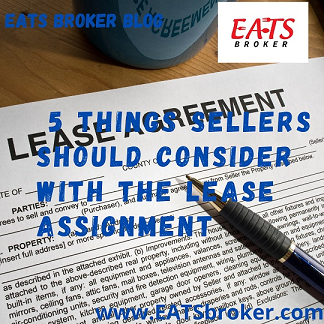5 Things Sellers should consider with the lease assignment:
The best day of a Restaurant owner’s life in the business world is usually when they first open the doors to their restaurant! The Restaurant Industry can be a tough business and the second-best day for a Restaurant Owner is usually when they sell the restaurant. When it’s time to sell, the business owner will prepare docs to provide to a potential buyer and review the lease signed with the landlord.
Most Restaurant owners have to dusk off the original lease and review what obligations they have to the landlord, some don’t have a copy of the lease at all. A commercial lease can range from 1-90 pages or longer and contain some very specific language that can make it challenging for lease assignment approval.
Here are the top 5 issues a Restaurant Broker will find in a lease:
The Personal Guarantee:
Landlords want a blanket guarantee over the entire term of the lease, even if the seller completes a sale with a buyer. Someone buying or selling a restaurant should fully understand their obligations when it comes to a personal guarantee, and the financial obligations that come with the agreement. This clause allows the landlord to come after the original tenant’s personal assets long after they have sold their business if the current tenant defaults on the monthly rent. This is very important to negotiate upfront with the landlord so no surprises will come up when it’s time to sell.
Consent to Transfer:
As a restaurant broker interacting with landlords every single day on lease assignments, this clause can be very misleading. Landlords will write the vague language in the lease usually like “Shall not unreasonably withhold” or “Shall not unreasonably withhold” or “Same net worth as current”. This gives the landlord total control of who they will approve for the lease assignment. The lease needs to have specific, measured steps with a timeline in the event you ever transfer the store when leasing a restaurant.
Assignment Fee:
Landlords usually will have a legal team prepare the original lease and put protect themselves from future expenses of creating a lease assignment by adding an Assignment Fee. This is one of the biggest item sellers will overlook when reviewing a lease. This becomes a big issue when it’s time to sell and the landlord is asking for $5000 from the seller to have the right to assign the lease. Assignment fees range from $0-$10,000, negotiate this fee upfront before you sign the lease because you have the most leverage at that time.
Option Terms with no agreed rent amount:
The landlord is not your friend when it comes to your monthly rent amount and yearly increases. The landlord is looking out for only one person in the transaction. He/she wants to improve their checkbook, and the bottom line and his earnings. The tenant should protect themselves from future increases by having the numbers agreed upon upfront, the national average for yearly rent increases is 3%-5%, but tenants cannot assume a landlord will not increase rates by more
Security Deposit:
The security deposit is usually required from landlords and can be the amount for 1-3x times monthly rent. When it’s time to sell a restaurant, what happens to this security deposit? Tenant’s should get confirmation upfront on how their security deposit will be returned if a lease assignment is approved.
When it’s come to landlords, remember it’s business and not personal and protect yourself. Use what you learned to get the best deal possible for a leasing assignment or a new lease for a restaurant. If you need help, contact EATS Broker to help you negotiate a deal.
For more information on the restaurant market and other available consulting services or restaurant valuations, contact Restaurant Business Broker Dominique Maddox at 404-993-4448 or by email at [email protected]. Visit our website at www.EATSbroker.com

